 Part
1 Clearing the Decks - Part 2 Life During
Wartime - Results, table and transfers
Part
1 Clearing the Decks - Part 2 Life During
Wartime - Results, table and transfers
Leeds United climbed into the Championship top six by beating Doncaster
3-0 on 14 December 2013, but then stuttered badly with a drab home defeat
to Blackburn on New Year's Day. Elland Road was like a mournful library
that evening as the visiting fans put their collective fingers to their
lips and ordered, 'Shhhh!'
What followed was even worse, a shock FA Cup reverse at Rochdale and
a 6-0 hammering at the hands of Sheffield Wednesday.
It was about then that Massimo Cellino, a 57-year-old agricultural entrepreneur
from Italy, who owned Serie A club Cagliari, came striding extravagantly
onto the scene.
The Italian, known as mangia-allenatori (manager-eater), had a
reputation for a 'Ready, Fire, Aim' approach to managers, having dispensed
with the services of 36 during his 22 years with Cagliari. It did not
appear that he would offer the stability the club craved.
Cellino had initially been enlisted by Sport Capital to offer advice
on their deal but his real intentions became clear as he launched his
own attempt to buy the club. Son Ercole set tongues wagging by publishing
pictures from inside the stadium via Instagram on 22 January.
Cellino flew to London over the weekend of 18/19 January to pursue his
interest; his representatives were now ubiquitous at Elland Road and Thorp
Arch.
The TogetherLeeds group was ready to submit a bid when negotiations between
Sport Capital and GFH reached an impasse. Farnan used Twitter to suggest
that TogetherLeeds would come forward with a bid if Sport Capital failed
to conclude a deal.
Haigh insisted that Sport Capital 'remain as committed as ever to finalising
this', but on 29 January their deal was on the verge of collapse. Andrew
Flowers launched an outspoken attack on GFH, revealing that Sport Capital
had lowered their bid, originally worth £50 million, after 'a number of
things have come to light which were not as originally described' during
due diligence. GFH rejected the reduced bid.
Flowers criticised GFH for considering Cellino's offer, accusing them
of breaching an exclusivity deal by speaking to the Italian, whose suitability
he derided. He contemptuously wondered out loud whether Cellino understood
anything about the culture of Leeds United, its fans, its heritage, or
British football. 'As lifelong fans we believe our offer and plans were
in the best interests of the club and its loyal supporters. This boils
down to much more than money but GFH have chosen to ignore that. We believe
the owners have breached their covenant with us but much more importantly
they have breached their covenant with the fans.'
On 30 January, Sports Capital withdrew from the deal. Haigh said they
had been ready to complete the transaction in time for the January transfer
window, but some of his backers developed cold feet about being able to
provide the required financial support.
Two days earlier, Cellino was en route to Elland Road to watch United
play Ipswich. He changed his mind at the last minute and flew home to
Italy but requested that his associate, the former Middlesbrough defender
Gianluca Festa, be given a seat on the bench.
The demand followed two appearances by Festa at Thorp Arch, including
the final training session. It was a flagrant attempt to undermine McDermott
and rejected on the day of the game.
It was evident to McDermott that he was unlikely to survive a Cellino
takeover and banning Festa from the touchline was a tokenistic decision.
GFH could have signalled their support for McDermott by calling the Italian
to task, but they were captivated by the colour of Cellino's money and
prepared to indulge him.
Both Sport Capital and TogetherLeeds were fully behind McDermott while
Cellino wanted him out. The three parties were all being courted by GFH
and the bank was unwilling to come down at the time in any camp, sending
out a clear signal that they would do whatever they needed to get the
best deal. The future well-being of the club figured little in their thinking.
back to top
A source close to negotiations claimed that for GFH it was all about
their public image in the Middle East. 'What the bank wants is to exit
with 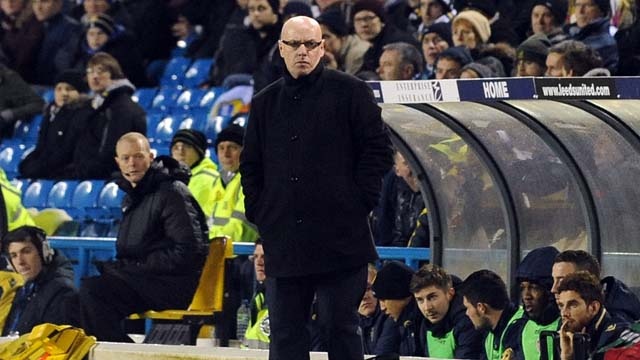 face,'
he said. 'It wants to preserve its share price. When this is over it has
to look like a good deal for GFH. The bank will do what's best for the
bank.'
face,'
he said. 'It wants to preserve its share price. When this is over it has
to look like a good deal for GFH. The bank will do what's best for the
bank.'
Now that the rules of this particular game were drawn up, with principle
shown the exit by blatant self-interest, nobody would be swayed by exhortations
to do the right thing. There was no way that McDermott would offer GFH
or Cellino an easy out by resigning and who could seriously blame him.
Phil Hay wrote, 'He held a three-year contract and an owner who chose
to cull him after less than 12 months and 30-odd games should have the
decency to pay him off. McDermott made mistakes last month and certain
results were on him. Managers are not made of Teflon. But he was asked
to fight his way out of the woods while people above him set the trees
on fire. It was hard for him and his squad to do anything else but burn.'
When he sacked McDermott, the decision relayed by lawyer Chris Farnell
even before his takeover had been completed, Cellino outdid even his own
eccentric reputation.
McDermott objected vehemently to the request for Festa to sit in the
dugout and complained that his authority would be undermined. Farnell
rang McDermott during the afternoon of Friday, 31 January, to tell him
that he had been dismissed.
Ross McCormack went on TV to express his anger and two sponsors, Enterprise
Insurance and Flamingo Land, threatened to withdraw their financial support.
Acting chief executive Paul Hunt was also dismissed. There were conflicting
reports regarding Haigh; initially it was understood that he would take
over as chief executive, but the BBC's Adam Pope later claimed Haigh had
resigned in protest at McDermott's sacking.
With Cellino ensconced at Elland Road, more than a hundred supporters
descended on the stadium and barricaded an entrance in an attempt to speak
to Cellino, but he managed to sneak away.
Even less savoury than the sacking itself was the way the club handled
it. McDermott was sent out to front a press conference while the directors
studiously kept out of the firing line. He was his customary dignified
self, with no bad mouthing of the owners. A 'dumping by text' followed,
with a lawyer ringing to say he was fired; no-one at the club had the
decency to sit down for a face-to-face conversation.
There was a twist to come. The decision had been taken without the agreement
of GFH Capital, who still claimed decision-making authority. Their directors
restored McDermott, ringing him to confirm that Cellino had exceeded his
authority.
This action was bizarre because the men behind GFH were fundamentally
split on the merits of the manager, with Al Rayes in a furious rage as
Leeds lost 6-0 at Sheffield Wednesday on 11 January.
During the first half, Al Rayes called Haigh to tell him, 'Fire Brian.
Do as you're told.' Haigh recalled, 'You can see in a lot of the pictures…It
wasn't me looking at Twitter, it was me looking at idiot messages from
Hisham with his bad spelling and his incompetence, he was telling me to
fire Brian and I was saying, "No, I'm not going to do it".'
Another text message pinged through, which read, 'OK I will call the
BBC and I will tell them I have fired Brian.'
Al Rayes rang the BBC, undermining the credibility of the entire club.
'It was this kind of knee jerk inconsistency every day that I had to
deal with,' said Haigh. 'If you want to remove a manager, you need to
have a succession plan in place or have a thought through process. Two
weeks ago, you're talking about extending his contract to five years.
Two weeks later because you have a bad day in a football match, which
happens, all of a sudden you want to 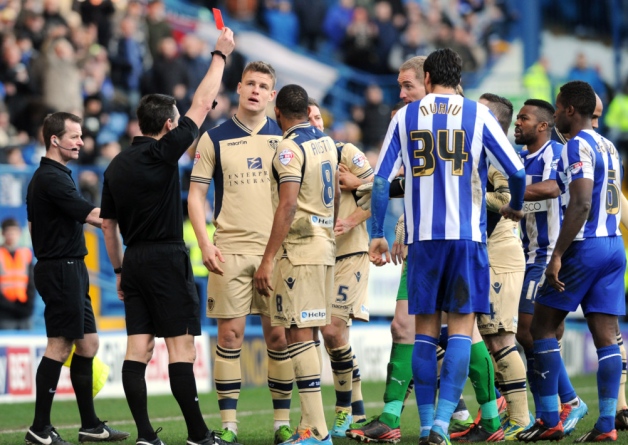 get
rid of him and you want to tell the BBC at half-time.'
get
rid of him and you want to tell the BBC at half-time.'
Haigh went to brief McDermott. He was trying to rally the team at the
time and did not need the distraction of a succession of manic calls from
Al Rayes. 'Brian don't answer any of these calls,' Haigh told him. 'You've
got to let it calm down. If you answer this call it could be disastrous.
I will say that I've spoken to you. I'm going to lie to Hisham, I'm going
to say that I said this, this, and this to you. This is what he wants
me to say. I'm not going to say that because this is ridiculous. You've
got our support, please ignore them. We're trying to get the deal through
with Sport Capital. We want you to stay.'
Haigh described the mess created and the 'flip-flopping inconsistency'
as disastrous for any business, let alone football.
back to top
He recounted the tale of a memo which Al Rayes insisted was sent to McDermott.
It was tantamount to constructive dismissal. 'Of course, Hisham doesn't
understand the words constructive dismissal.'
Haigh asked the club's lawyers to draft an appropriate letter. He didn't
really want to send anything but at least it would not lay them open to
legal challenge. Haigh took it to Al Rayes, saying, 'We don't want to
send it but if you're insisting, this one's alright.'
Astonishingly, Al Rayes changed it to read as he wanted 'with obviously
his great English, his great spelling, and his knowledge of law and football
and insists that it's sent but he doesn't want to put his signature on
it'. Al Rayes told Haigh to sign it, but he refused. It was sent anyway
with Haigh's name on it but carrying no signature.
McDermott declined to take charge of the Huddersfield game on 1 February
and at 12:15 on the day of the game, Haigh rang assistant manager Nigel
Gibbs and asked him to deputise.
A traumatic 24 hours ended with McCormack grabbing a hat trick in a breathtaking
5-1 victory. 31,103 supporters were on hand for an emphatic show of support
for McDermott; Gibbs said, 'The team was prepared by Brian. It's his team,
his performance, and his victory … It was one for Brian.'
As United blitzed Huddersfield to claim their first win in nine, support
rained down from the stands, with 'Bring Back Brian' and 'Cellino No!'
banners prominent. In contrast, GFH Capital were the subject of insults
throughout the afternoon.
In an echo of their opposition to the long-departed Bates, supporters
waved their shoes in the air in acknowledgement of the refrain 'Shoes
off if you hate GFH'. When play got under way, a chorus of 'You don't
know what you're doing' echoed round the ground.
On 4 February, it was reported that a new consortium, comprising members
of Sport Capital and TogetherLeeds, had put forward an alternative bid,
matching the terms put forward by Cellino. Andrew Flowers was a driving
force of the move after aligning himself with Farnan, encouraged by the
failure of Cellino to seal his deal.
The Italian's proposals appeared to have been scuppered when security
staff and two members of United's board escorted Farnell out of Elland
Road. He had been attempting to complete the paperwork for Cellino's takeover
and the consortium took his failure to do so as a green light.
Flowers threatened to take the Football League to court if it approved
Cellino's takeover, appointing Timothy Dutton QC to prepare a legal case.
Cellino had received a suspended sentence in 2001 for false accounting,
while his representatives claimed a 1996 fine for fraud was overturned
on appeal. In Britain, both convictions would be regarded as 'spent' under
the Rehabilitation of Offenders Act, an argument which Cellino seized
on as it meant that there was no obligation to disclose them, insisting
that the offences were no longer relevant.
Cellino's lawyers argued that he could not be barred for the offences.
Also described as irrelevant was the fact that he could face a trial after
being arrested in Italy in 2013 as part of an ongoing investigation into
the alleged misuse of public funds. Under League rules, the doctrine of
innocent until proven guilty applied.
The League's owners' and directors' test stated a disqualifying condition
was having an unspent conviction for offences including dishonesty, corruption,
and perverting the course of justice but it made no reference to alleged
offences.
Flowers filed a winding-up petition against the club on 29 January for
the Enterprise loan, which remained outstanding.
back to top
GFH immediately refuted the claim, insisting that the club had always
met its financial obligations and would continue to do so.
Originally, their statement had included a further paragraph stating,
'As there were no valid grounds to issue the petition, we can only assume
that Mr Flowers is seeking to influence the deliberations of the club's
owners and management in relation to the takeover negotiations.' The offending
words were rapidly removed.
Cellino snapped back, 'The money was paid on Friday. Me and [Salah Nooruddin],
we're serious people. Between us there is no problem, but in the middle,
there is a problem, there is a lot of sh*t going on.'
Cellino accused Haigh of 'tricky behaviour' and complained about GFH's
willingness to engage with the late bid from his rivals.
Despite GFH's assertions that they wanted United to be self-funding,
they continued to lean almost exclusively on money provided by others.
They took a £1.5 million loan from Cellino and £3.5 million was owed to
Haigh. Flowers contributed to the £6 million invested by Sport Capital.
Elland Road staff had been paid in full and on time in January, but only
thanks to Cellino advancing the cash to fund the payroll. At least one
of Haigh's loans was provided for the same purpose, emphasising United's
hand-to-mouth approach, with the club haemorrhaging cash.
Flowers' group conceded that matching Cellino's £25 million bid might
be beyond them. Leeds no longer had the luxury of time and nor could they
wait indefinitely for a change of ownership.
Sport Capital promised to match Cellino's price and demanded an immediate
response but talks dragged on and Flowers declared himself out around
lunchtime on 5 February. He was forced to withdraw his winding-up petition
when Cellino paid off the debt.
On 7 February GFH Capital exchanged contracts with Eleonora Sport with
a view to acquiring 75% of the shares. The deal was worth £24 million
over three years with another £9.5 million if United were promoted.
There was a fly in the ointment, however, with the League rejecting the
proposal on 24 March when Cellino failed the owners' and directors' test.
Cellino successfully appealed the decision with an independent QC overruling
the League.
Cellino claimed that if he had known at the start how difficult the takeover
would be, he would not have proceeded. He said the League was 'really
tricky, they made trouble at a time when I couldn't walk away... I don't
want to be here if the Football League don't want me but who are they
anyway?...They are acting for what's right, the principles, the ideals.
Me, I sort out the f***ing problems at Leeds. I prefer to play by the
rules, not to cheat.'
The Italian went on to berate the management competence of GFH, saying:
'You can see what's been happening here. It's been done by people who
knew they weren't staying. And now I have to clean up the sh*t...GFH made
big mistakes but not on purpose. That's why I don't go against them for
the moment. But the men who were here in GFH's name did a really, really
bad job.'
Haigh had filed legal actions against Leeds United and GFH. Cellino planned
to make his own breach of contract claim against the bank Immediately
after he completed the purchase. Haigh would be a star witness because
Cellino was convinced he had been tricked into buying the club, denied
access to important facts and information. This was another reason why
GFH tried to discredit Haigh who said, 'All of a sudden I became this
very important person. If they lose on his claim, then it costs them a
lot of money … They would have gone bankrupt.'
The issues with the League rolled on, with Cellino still to answer accusations
in a court in Sardinia on 18 March that he had avoided payment of VAT
on a luxury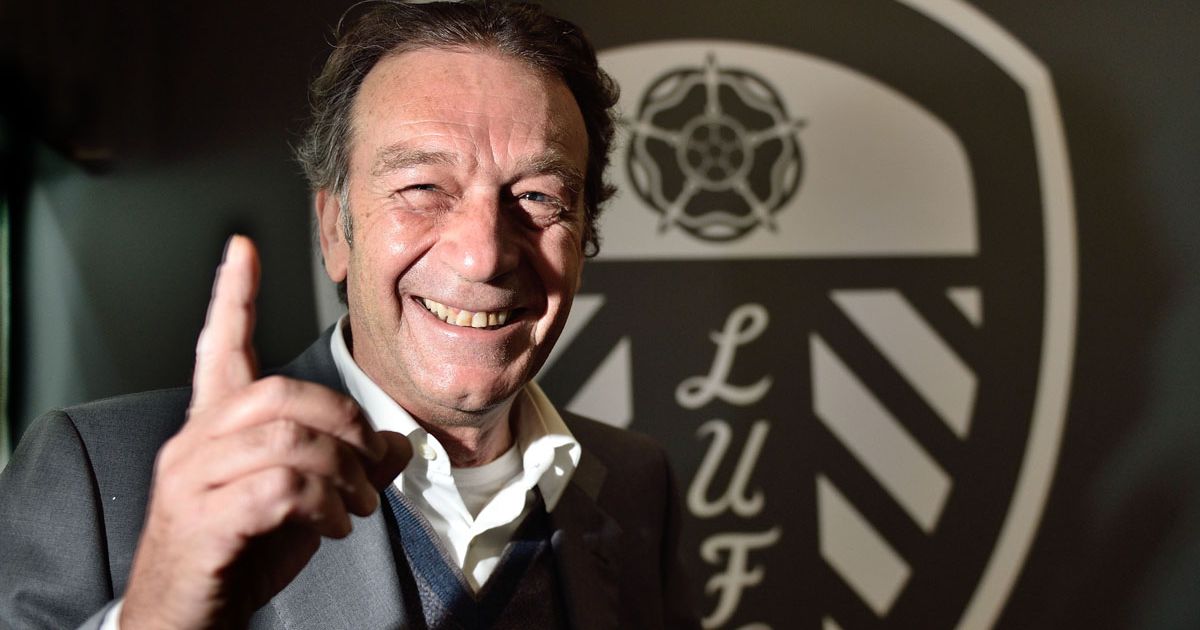 yacht.
yacht.
A meeting of the Football League board was scheduled to take place on
13 March, but the new allegations of tax evasion dissuaded them from approving
the takeover before his appearance in court.
On 18 March, a Cagliari court found Cellino guilty of avoiding payment
of more than €400,000 in import tax on a yacht he bought in 2010. Judge
Sandra Lepore fined Cellino €600,000 and ordered the confiscation of the
vessel.
Cellino's lawyer, Giovanni Cocco, said that the yacht was owned by a
US company and that Cellino was not bound to pay tax on it. The prosecution
alleged that the company was formed as a tax evasion device only a month
before Cellino took the yacht to Italy.
Cocco confirmed that Cellino planned to appeal against the ruling, stating
that he should be considered innocent until the process was exhausted.
United's accounts for the financial year to June 2013 were yet to be
filed, but it was an open secret that the club was losing more than £1
million every month.
back to top
While Enterprise's loan had been settled, bills were going unpaid, most
notably to the constructors of a new 3G pitch at Thorp Arch, and Cellino
and Haigh both had to pump money in.
Claiming that payment got stopped by the winding-up petition, Haigh sought
to allay the concerns. The money was sat in the bank account but the club
wasn't allowed to settle the bill, Once the legal process was over, payment
was made in full.
Seemingly revelling in United's distress, the League continued to prevaricate.
GFH wrote to them on 20 March, urging an end to the uncertainty and accusing
them of being overly rigorous, because they were influenced by 'the unprecedented
backdrop of the objections you have received from two failed bidders for
the club, who have attempted to stop the takeover'.
The League rejected the plea out of hand and on 24 March they struck
an even greater blow, confirming that they had disqualified Cellino from
buying a majority stake in Leeds.
Cellino was devastated but, having come so far, there was no way that
he was going to take the decision lying down.
With no one willing to fund the financial black hole, the club was in
dire straits. General staff at Elland Road received their salaries for
March on time, but the players were not paid as scheduled.
After an intervention by the PFA, Cellino funded 50% of the players'
wages with the balance to come after his appeal had been heard a week
later. All the while, GFH sat on their hands, content that their agreement
with the Italian obliged him to meet all costs for the six months through
to July.
Cellino was bitter, making his feelings crystal clear when he was targeted
by a cold call from a Leeds supporter. He labelled Haigh 'the devil' and
accused him of attempted blackmail, described the United side as the worst
football team he'd ever seen, and criticised McDermott for spending too
much time moaning and not enough time coaching.
Cellino threw some light on the season-ticket renewal situation. United
would generally have sent out early renewal forms but hadn't done so,
at Cellino's behest, explaining that fans shouldn't be expected to pay
for tickets so far in advance with the division yet to be determined.
He said the tickets would go on sale at the end of the season if his takeover
proceeded.
Cellino's action caused a dispute with GFH who said they needed the money
to pay the players' wages. When Cellino said he'd cover the costs, they
accepted his terms.
The only people Cellino had anything positive to say about were the supporters:
'Fans are not for sale, they have feeling and you don't buy feeling. You
can buy a bitch for one night, but you don't buy the love my friend.'
Cellino's appeal concluded on 31 March with judgement reserved, extending
the agony until 5 April when the outcome was confirmed; Cellino was cleared
to complete his takeover with the QC overturning the League's original
decision.
Cellino's lawyers successfully argued that because he had appealed against
his tax conviction, he was considered not guilty under Italian law. The
appeal process could take up to nine months.
The QC, Tim Kerr, allowed the appeal, finding the League was wrong to
decide that the Italian had acted dishonestly, before seeing the written
judgment of the Cagliari court. Those written reasons were due by mid-June. The
offence of tax evasion, Kerr concluded, could involve dishonesty, or in
Italian law a person can be convicted of failing to pay the tax without
having done so dishonestly.
of the Cagliari court. Those written reasons were due by mid-June. The
offence of tax evasion, Kerr concluded, could involve dishonesty, or in
Italian law a person can be convicted of failing to pay the tax without
having done so dishonestly.
Leeds responded to the news by announcing that Eleonora Sport would take
up a 75% stakeholding with GFH and other investors retaining 25%. Cellino
would become president and head up a new-look board with Haigh as chief
executive officer.
On 8 April, Cellino and sons Ercole and Edoardo, along with his American
financial adviser Daniel Arty, were appointed directors, joining Haigh,
Patel, and Nooruddin. Cellino sacked Haigh on 3 June and Nooruddin resigned
eight days later.
Haigh said that he was left with no alternative other than to resign
as managing director of the club following various statements made by
Cellino.
He claimed that his support of the club had extended to lending money
to ensure that tax, players, and staff were paid and to underpin its continuing
viability. On occasions he was required to pay running expenses on his
personal cards and there were 'last-minute dashes to wire personal money
to the club to pay HMRC'. The loans were still outstanding and Haigh complained
that he had to deal with and manage what could only be described as a
crazy situation. He enjoyed very limited support from those who should
have supported the club and the management, whilst at the same time having
little or no decision-making capacity.
Haigh said he had arranged for Sport Capital to convert some of the loans
made to the club into shares and once complete, 'those shares will be
given to the fans, so it truly will be the fans' club.'
As part of the takeover, Cellino's Eleonora Sports agreed to pay off
most of the debt over three years. United's position weakened further
in 2013/14.
A profit on player trading of £3.9 million in 2013 was replaced by a
loss of £392,510 as GFH gave lessons in how not to run a football club.
They were clearly out of their depth.
As a consequence, the club failed to comply with the Football League's
FFP regulations, which allowed a maximum loss of £8 million.
Cellino pulled few punches in the annual report. Addressing all the structural
and financial issues would take time but he had launched a far-reaching
review to identify required action. He described himself as 'a steward
and a guest and one who needs to take its patient out of a critical condition,
put it into accident and emergency and then allow it to independently
walk and then run'.
There had been significant cost cutting and redundancies, but the mortgaging
of future gate receipts made it difficult to improve incomings. The Enterprise
dispute meant that player recruitment had been delayed, making preparations
for the new season problematic.
back to top
Cellino boasted of the investment made by Eleonora Sport to stave off
financial meltdown. He acknowledged the failure to comply with FFP but
promised that he would 'never again let this club be held to financial
ransom … None of my companies have ever gone into administration and none
of them ever will.'
He estimated that it would take 12 to 18 months, through to July 2016,
to bring true financial stability but noted that calendar year 2014 had
seen a major improvement.
The Italian spoke of the debt owed to the fans and how their support
constituted 'a love affair with a club that is unique in all of the 25
years that I have been involved in football'. His statements echoed much
of the positivity of GFH and Haigh before him, but this time, the feeling
was very different. He had a passion, a fire, a love for his new club
which spilled over, at times dangerously so. It was as if Ridsdale had
grown a foot, lost a stone, drunk a bottle of whisky, and enjoyed a lifetime
of fags.
He talked of the club belonging to the community, the city, and its fans
and a need to forge real relationships with them. He eagerly accepted
these responsibilities and sought to rebuild bridges. He was clear that
he was in charge, 'I'm driving the bus, I have no plans for any other
investors…I want the fans close to the club, we don't need anyone else…My
dream, it is for the fans of Leeds…I want the fans to become owners of
the club again because who owns the club? It's the fans. We are just temporarily
here. I'm here to clean up and let the fans feel as though they own the
club. You can't buy the passion and you can't easily buy a stadium, Leeds
has all of these. It's why I've bought it.'
His 23 years running Cagliari had taught Cellino that fans were key,
you could do nothing without them. Anything else could be bought, but
not the fans, it was impossible to buy loyalty.
'I was raised as a manager, not as a bullsh*t president who puts his
tie on, eats some roast beef, and f***s off home. I look after everything.'
Cellino might well have been batty as a box full of frogs and impatient
to the extreme, but it was clear that he cared greatly about the club
and its fans and would do everything he could to restore it to health.
It was evidently an ego thing for him, but he was a man with a conscience,
who wanted the best for the fans and was determined to address the deep-seated
malaise that had only festered under the ownership of GFH Capital.
The players got an early taste of what life under Cellino could be like.
After a 5-1 defeat to Bolton on 8 March and beside himself with rage,
the Italian vented to the Press, 'We didn't even try to play and they
made the fans ashamed. The players pissed me off because they didn't fight
for the club. For what they did today, I would kick their a***s, one by
one. They are guilty. They were 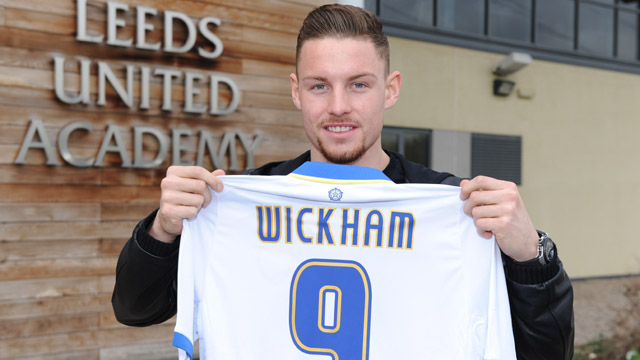 without
pride and should be ashamed of themselves. They are chickens.'
without
pride and should be ashamed of themselves. They are chickens.'
The Italian was no shrinking violet!
Details of Cellino's fractious relationship with Haigh became clear a
few days later when the Italian called in West Yorkshire Police after
secret spy cameras were discovered at Elland Road. The force launched
a theft investigation, relating to the use of club funds to install the
cameras.
When interviewed, Haigh claimed that surveillance devices were installed
due to suspicions that Class A drugs were being used at the club. He said
the devices had been 'properly paid for'. The presence of the cameras
in the boardroom and toilets was not enough to prompt a criminal probe,
but allegations of purchase using misappropriated club funds were. After
a six-month investigation the police decided to take no further action.
On 10 April, Cellino moved to kill off a winding-up petition served by
HMRC after a failure to meet a tax bill of more than £500,000. United
were due to pay the Revenue by the end of March but missed the deadline,
prompting HMRC to launch legal proceedings. Cellino paid the bill in full.
That same day, the Football League rubber stamped the takeover.
McDermotti's side never fully recovered from a mid-season collapse that
saw them win just two games in sixteen, slumping in the process from 6th
to 14th. A 2-1 victory against Millwall on 22 March arrested the run,
but Leeds then lost a further five games on the bounce, drifting to a
disappointing finish.
Stoke City and England keeper Jack Butland and Sunderland striker Connor
Wickham arrived on two high-profile loan deals, hinting that there might
be light at the end of the tunnel and even the potential for both deals
being made permanent. Wickham returned to the North East after five games
without troubling the scorers, but Butland was an ever-present, turning
in some decent displays. He returned to his parent club at the end of
the season, prompting unrest among the supporters.
While McDermott struggled to find a solution, Cellino was busying himself
with plans to address the club's financial plight.
- The Thorp Arch training facility was closed from mid-May until the
first-team squad reported back for pre-season training in July, meaning
that several non-playing staff would relocate to Elland Road for the
close season
- Lawyers were brought in to review operating costs and help get a grip
on a situation Cellino described as 'unbelievable, impossible'
- Redundancies from an anticipated decimation of the workforce were
expected, including club ambassadors Eddie Gray, Peter Lorimer, and
Dominic Matteo
- Players were instructed to bring packed lunches to pre-season training,
with Cellino closing the kitchen at Thorp Arch
The rift between Cellino and McDermott deepened when the latter returned
home to the south of England after his mother was admitted to hospital.
He denied allegations that he had taken a holiday. Saying the club was
'not managed by anybody' and claiming to be unaware of McDermott's whereabouts,
a furious Cellino vented his frustration in a television interview. When
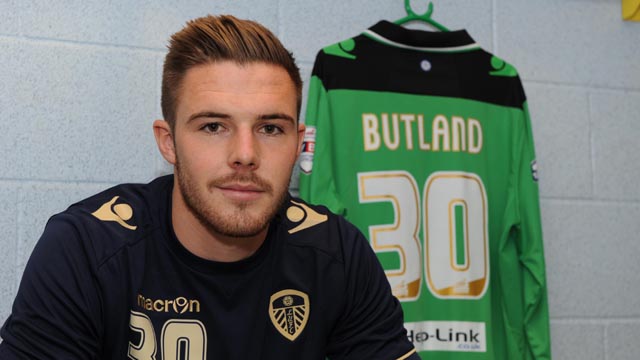 McDermott
received a letter, asking him to explain the absence of players and staff
from Thorp Arch and outline his plans for pre-season, the manager replied
in writing, providing details of the fitness programmes given to the first
team and setting out a proposed pre-season schedule.
McDermott
received a letter, asking him to explain the absence of players and staff
from Thorp Arch and outline his plans for pre-season, the manager replied
in writing, providing details of the fitness programmes given to the first
team and setting out a proposed pre-season schedule.
His position was fragile; Cellino had drawn up a retained list with the
help of Benito Carbone, the ex-Bradford City striker, who he had been
working with since April. McDermott had no input to the decision and looked
like a dead man walking, though Cellino was reluctant to foot a £1.5 million
compensation bill due if he pre-emptively terminated a contract with two
years remaining on it.
Another formal letter from Cellino ordered McDermott to report back with
his coaching staff and first-team squad on 28 May, more than a month earlier
than planned.
That brought things to a head and two days later Cellino 'reached a mutual
agreement' with McDermott to end his spell at the club, with Cellino wanting
to hire a head coach rather than a manager. It was akin to a wounded animal
being put out of its misery after months of agony.
Part 1 Clearing the Decks - Part
2 Life During Wartime - Results, table and
transfers
back to top












 Part
1 Clearing the Decks - Part 2 Life During
Wartime - Results, table and transfers
Part
1 Clearing the Decks - Part 2 Life During
Wartime - Results, table and transfers
 face,'
he said. 'It wants to preserve its share price. When this is over it has
to look like a good deal for GFH. The bank will do what's best for the
bank.'
face,'
he said. 'It wants to preserve its share price. When this is over it has
to look like a good deal for GFH. The bank will do what's best for the
bank.' get
rid of him and you want to tell the BBC at half-time.'
get
rid of him and you want to tell the BBC at half-time.' yacht.
yacht. of the Cagliari court. Those written reasons were due by mid-June. The
offence of tax evasion, Kerr concluded, could involve dishonesty, or in
Italian law a person can be convicted of failing to pay the tax without
having done so dishonestly.
of the Cagliari court. Those written reasons were due by mid-June. The
offence of tax evasion, Kerr concluded, could involve dishonesty, or in
Italian law a person can be convicted of failing to pay the tax without
having done so dishonestly. without
pride and should be ashamed of themselves. They are chickens.'
without
pride and should be ashamed of themselves. They are chickens.' McDermott
received a letter, asking him to explain the absence of players and staff
from Thorp Arch and outline his plans for pre-season, the manager replied
in writing, providing details of the fitness programmes given to the first
team and setting out a proposed pre-season schedule.
McDermott
received a letter, asking him to explain the absence of players and staff
from Thorp Arch and outline his plans for pre-season, the manager replied
in writing, providing details of the fitness programmes given to the first
team and setting out a proposed pre-season schedule.